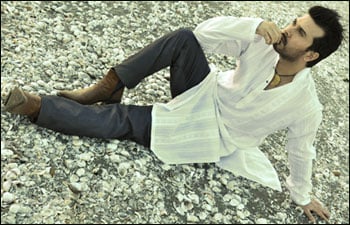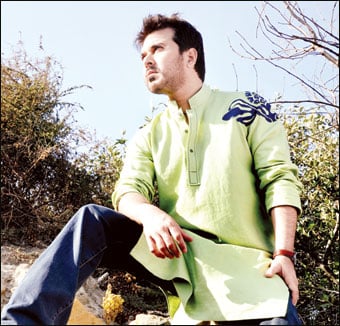 “I never condemned music or stated that it is haram,” Ali Haider says as he sits opposite me, comfortably in a white shirt and blue jeans. The man who gave us hits like ‘Qaraar’, ‘Purani Jeans’ and over ten music albums hasn’t disappeared. He has grown up and matured but he certainly hasn’t left. The contribution of Ali Haider to the pop world cannot be forgotten. “I never condemned music or stated that it is haram,” Ali Haider says as he sits opposite me, comfortably in a white shirt and blue jeans. The man who gave us hits like ‘Qaraar’, ‘Purani Jeans’ and over ten music albums hasn’t disappeared. He has grown up and matured but he certainly hasn’t left. The contribution of Ali Haider to the pop world cannot be forgotten.
I remember speaking to Ali somewhere in 2007 after the release of his fantastic album, Jaanay Do. It was his most coherent album in years. And with collaborations with music producers Rohail Hyatt, Shahi Hasan and lyricist Anwar Maqsood, the record should’ve garnered more appreciation than it did. Some time went by and then came the news that Ali Haider had quit music. Some said he had taken a religious path ala Junaid Jamshed, condemning music and designing clothes (if you will). While the rumours were many, it did seem that a shift had surely taken place. Ali released two albums, but they were not music records. They were devotional, filled with hymns.
What happened, I ask Ali.
“Jaanay Do happened. It made an impact. Life was going great. In 2009, we were expecting a son. It was huge for me, my family. And we all became very attached to the pregnancy. We were expecting a son and it was a big deal. But at five months, we found out that there was a complication. Some said we should abort. It was a strange time. But we had faith in God so we decided to go ahead with it and hope for the best.”
But things didn’t go as Ali had hoped. Ali continues, “My son didn’t make it. He just didn’t and that devastated me. It just devastated me to such an extent that I just didn’t know what to do. You know, artists are sensitive as it is and this was something personal and it was painful. And so I couldn’t sing. It all disappeared from within me. I tried to sing but I couldn’t. For three months, I was in a really bad place. It was like being a prisoner.”
 And that’s when the music stopped playing. And that’s when the music stopped playing.
“For 20 years, I did it all. I’ve seen good times, high times and bad times, seen them all. I’ve traveled all across the globe with my music. But after all this, maybe it was a phase, I don’t know, I couldn’t sing.”
While Ali Haider was going through a shattering personal crisis, the industry rumour mill went to work.
“This is when people started writing and reporting that I had condemned music. I never, ever said that music was haram. I said I couldn’t do it anymore because I couldn’t do it then. People said that he’s become a maulvi but that’s not true. I come from a liberal family, I watch television, my daughter watches Atif Aslam so it’s not like I turned into a fundamentalist overnight.”
Ali created two devotional albums because that’s what suited him at that moment in time. And then came the fashion label, Qaraar.
“I decided that I have certain specific ideas about designing clothes so I set up this small section right here in my own house and I went to work. Once I started stepping out of the house, I started meeting people, I started returning to my usual self, slowly.”
Ali launched Qaraar’s outlet at Dolmen Mall in Karachi.
“It’s called Qaraar because I’m not ashamed or embarrassed by my music. We’re launching a line of ‘Purani Jeans’ so I have nothing against music. But mostly because I stayed silent, people assumed certain things. I didn’t want to talk about anything at that moment so I never clarified when people assumed that I had become a maulvi.”
Ali then discovered the poetry of Bulleh Shah.
“I read hymns because it helped me in expressing myself. While I couldn’t do music, it was the only thing I could do. But then I discovered the verses of Bulleh Shah. And he was all about humanity.”
And a comeback to music suddenly seemed possible.
Ali recorded the vocals in a studio where the engineer put some music to it. What started as an experimental exercise led to the creation of a song, ‘Ki Jaana Main Kaun’.
During this experiment, Ali also discovered something bizarre.
“I learnt that most people who record hymns and go onto bash music for being haram use music for tracking.
See, they’ll use music to record a hymn so that it flows naturally and once done, they simply erase the music and leave the vocals. Or in some cases, a hymn is recorded on the tune of a song. My question is if it’s haram, why use it at all? I find it hypocritical.”
The musician returns…
Ali’s next album, Ki Jaana Main Kaaun, takes poetry from Bulleh Shah as well as other Sufi poets. It aims to be different. But it doesn’t mean that classic hits like ‘Purani Jeans’ will be ignored.
 “As a musician, one has to keep growing. And hopefully that will reflect in the new album. While these songs will be different and certainly more mature than cheesy pop songs, it certainly doesn’t mean that I’m no longer interested in performing those numbers. On the album though, people will hear the new stuff. It’s eight songs and I can honestly say that I’ve never sung like this before.” “As a musician, one has to keep growing. And hopefully that will reflect in the new album. While these songs will be different and certainly more mature than cheesy pop songs, it certainly doesn’t mean that I’m no longer interested in performing those numbers. On the album though, people will hear the new stuff. It’s eight songs and I can honestly say that I’ve never sung like this before.”
“I don’t want to get mixed up with things that people say. I just want my work to speak for me. I have done things that appeal to me. I did Jadu which was a trance-electronica album, which wasn’t a popular genre here but I did it.”
With 80 per cent of the record wrapped up, Ali is all set to take the stage once again.
“I am open to concerts, I am open to shows and traveling once the album is out. And when onstage, I have no problems singing my old hits as well.”
Like his peers, Ali too sees India as a market but he isn’t gaga over Bollywood.
 “India is a market. And there is no harm in releasing one’s album there but there has to be a limit. Why are we so insistent on running so much Indian content on our channels? When it comes to cricket matches, we are arch-rivals. Otherwise we keep running very vulgar Indian film songs on our channels. The various heads at channels claim that advertisements don’t come in unless we have Indian content. What kind of a standard is it?” “India is a market. And there is no harm in releasing one’s album there but there has to be a limit. Why are we so insistent on running so much Indian content on our channels? When it comes to cricket matches, we are arch-rivals. Otherwise we keep running very vulgar Indian film songs on our channels. The various heads at channels claim that advertisements don’t come in unless we have Indian content. What kind of a standard is it?”
And when it comes to the music scene, Ali has a lot to say.
“Atif Aslam came with ‘Aadat’. It was different. It worked. Now there are ten singers out there trying to be Atif. And those songs are awful. And Atif works because he is doing what he wants to do. Same is the case with Coke Studio. Rohail didn’t think about selling songs to India. Which is why Coke Studio is such a huge success.”
Despite the break and a devastating reality, Ali Haider is looking all set to make a comeback. And rest assured, while it will be a different Ali Haider, the musician in him is still alive and kicking. Cheers to that. Welcome back, Ali.
- Wardrobe by Ali Haider
Photography by Farhan Naqvi |

